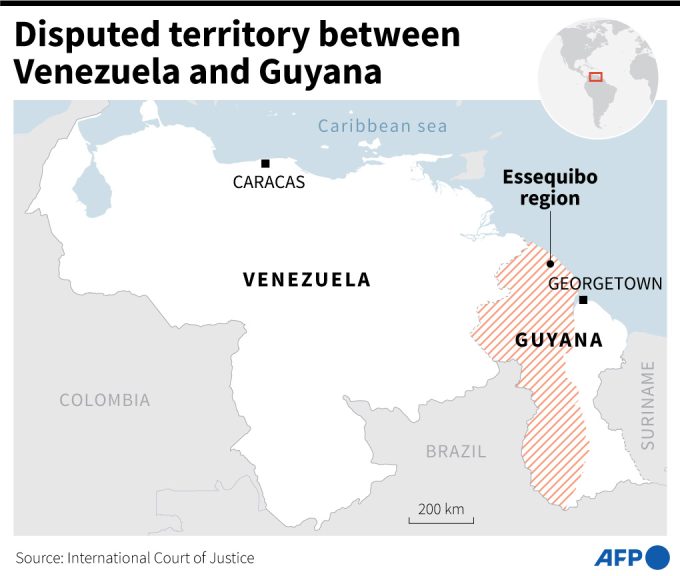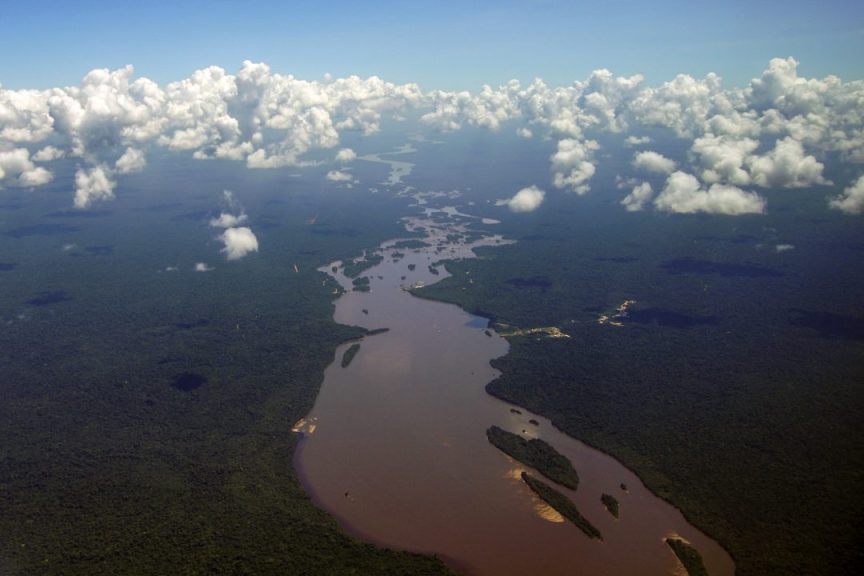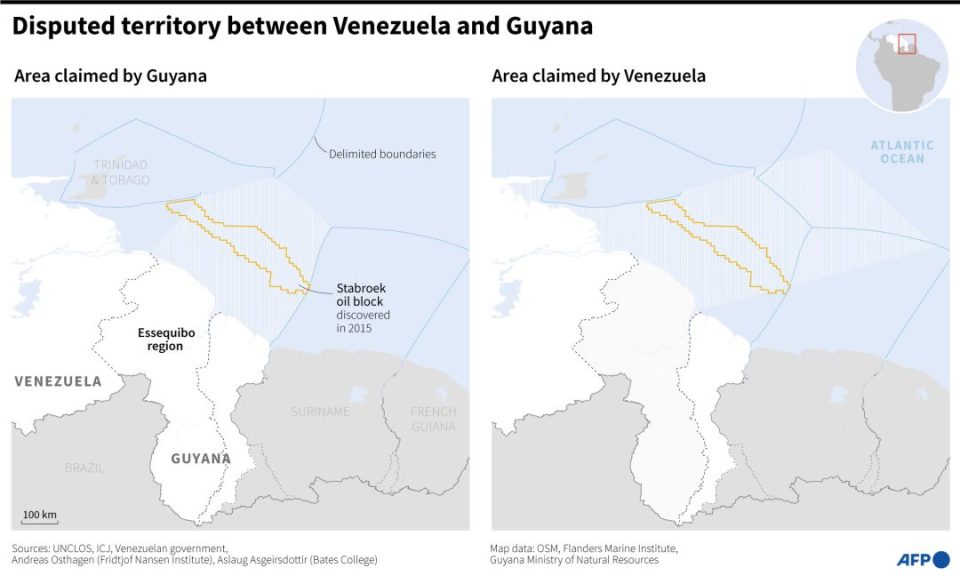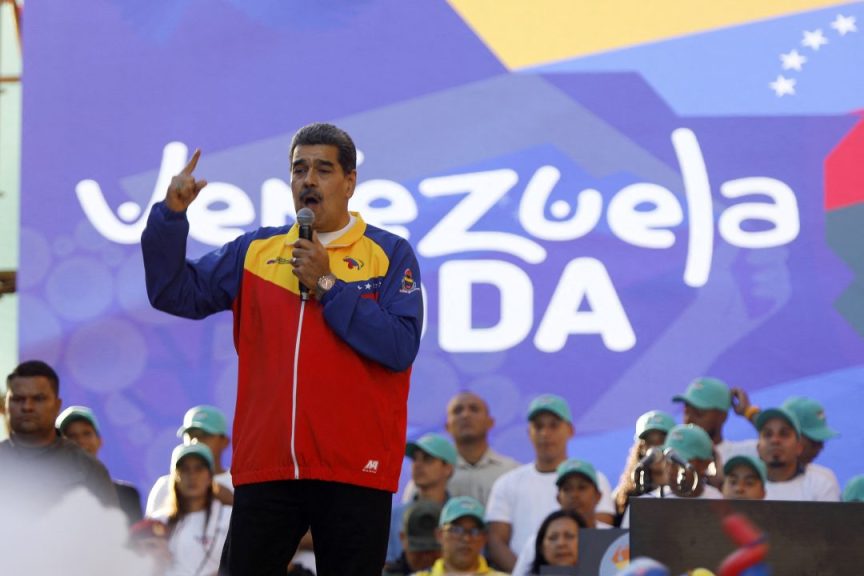- Home
- Middle East
- Essequibo, the Next Geopolitical Hot Spot?

©(Federico PARRA, AFP)
On December 3rd, Venezuelans will cast their votes on the annexation of Essequibo, a region under the governance of Guyana but claimed by Caracas. The outcome of the vote raises concerns about a potential military conflict between the two South American countries.

 Aerial view of the Essequibo River flowing through a section of the Amazon rainforest in the Potaro-Siparuni region of Guyana, taken on September 24, 2022. (Patrick FORT, AFP)
Aerial view of the Essequibo River flowing through a section of the Amazon rainforest in the Potaro-Siparuni region of Guyana, taken on September 24, 2022. (Patrick FORT, AFP)

 Venezuelan President Nicolas Maduro speaking during the closing campaign of the referendum on the defense of the Essequibo territory in Caracas on December 1, 2023. (Pedro RANCES MATTEY, AFP)
Venezuelan President Nicolas Maduro speaking during the closing campaign of the referendum on the defense of the Essequibo territory in Caracas on December 1, 2023. (Pedro RANCES MATTEY, AFP)
After Ukraine and the Middle East, is Latin America on the brink of a new escalation in regional violence? On December 3rd, Venezuelans will go to the polls for a referendum organized by President Nicolas Maduro. The pivotal issue at stake raises a potentially explosive question: Should Caracas annex the Essequibo region?
This name pertains to a border region of the country, currently under Guyana’s administration. Essentially, voters have to decide whether to endorse the annexation of this territory or not.
What is the Essequibo Region?
Covering an area of 159,542 km² and home to 135,000 residents, the Essequibo region is a territory that encompasses over two-thirds of Guyana's landmass. It is bordered to the east by the eponymous river, to the south by the Brazilian frontier, and to the west by the Venezuelan border.

The region's main wealth lies in its subsoil. Bauxite, copper, iron, aluminum, gold, and diamonds are among the minerals found in the coastal area of the region.
However, the prime focus of attention lies elsewhere. In 2015, the American oil company ExxonMobil announced the discovery of offshore oil deposits within Guyana's exclusive economic zone. Located roughly 200 km off its coastline, half of these reserves fall within the Essequibo region.
Why is Venezuela Claiming this Region?
The history of Essequibo is closely linked to European colonization in South America. In the late eighteenth century, the British gradually established their dominance in the region, ultimately taking control of Essequibo in 1814. This development did not align with the aspirations of the newly independent Venezuela, which maintained that the true border was demarcated by the Essequibo River to the east.
To resolve this territorial dispute, an international arbitration commission convened in Paris in 1899 and issued a judgment largely in favor of London, defining what has since become the western border of Guyana.
 Aerial view of the Essequibo River flowing through a section of the Amazon rainforest in the Potaro-Siparuni region of Guyana, taken on September 24, 2022. (Patrick FORT, AFP)
Aerial view of the Essequibo River flowing through a section of the Amazon rainforest in the Potaro-Siparuni region of Guyana, taken on September 24, 2022. (Patrick FORT, AFP)The country’s independence in 1963 led its Venezuelan neighbor to declare the Paris arbitration null and void. Meanwhile, Venezuela filed a complaint with the UN. This process resulted in the Geneva Agreements, signed in 1966. Through these agreements, both parties committed to seeking a negotiated solution rather than resorting to military measures. However, no diplomatic resolution has been achieved ever since.
What Lies Behind the Renewed Tensions?
Since then, the territorial dispute has persisted, straining relations between Guyana and Venezuela. However, the 2015 discovery of oil reserves has intensified Venezuelan ambitions, especially as the country is grappling with an economic crisis.
Hyperinflation, food shortages, a deteriorating health system, and mass emigration have become daily struggles for Venezuelans, while poverty is on the rise. The imposition of economic sanctions by the United States since 2017 has done little to alleviate the situation, instead confirming a further slide into authoritarianism. These challenges are reflected in President Maduro's approval ratings, which were stagnant at 29% in October 2023, according to the Caracas-based Consultores 21 institute.

Meanwhile, the Essequibo dispute has progressively transcended its purely territorial nature to morph into a matter of national pride, amplified by extensive government propaganda. The campaign for the referendum is a testament to this, characterized by resounding communication.
Amid heightened nationalism, the Guyanese authorities are engaging in further escalation. For instance, on November 24th, President Irfaan Ali, accompanied by his troops, attended the raising of the national flag near the border with Caracas.
In this context, Nicolas Maduro's emphasis on the Essequibo issue seems more like a political opportunism aimed at diverting attention from the country's economic challenges. This becomes all the more evident when viewed in light of the upcoming presidential elections in Venezuela scheduled for 2024. By shifting focus away from current issues related to Essequibo, the current Venezuelan leader hopes to improve his standing in the polls by appealing to nationalist sentiments.
What are the Potential Risks for the Region?
The purpose of the referendum in Venezuela is essentially consultative, lacking any binding implications. It primarily involves validating or rejecting previous legal decisions while also suggesting the establishment of a province based on the annexation of Essequibo.
While the probability of military intervention is currently low, it remains a viable option and a scenario Guyana is getting ready for. The country has explicitly stated that the referendum poses an "existential" threat because it could potentially lead to a "unilateral and illegal" takeover of the region by Venezuela.
 Venezuelan President Nicolas Maduro speaking during the closing campaign of the referendum on the defense of the Essequibo territory in Caracas on December 1, 2023. (Pedro RANCES MATTEY, AFP)
Venezuelan President Nicolas Maduro speaking during the closing campaign of the referendum on the defense of the Essequibo territory in Caracas on December 1, 2023. (Pedro RANCES MATTEY, AFP)Moreover, Caracas has increased the deployment of its armed forces near the border, conducting exercises in the region. In response, Guyana has elevated the alert level of its security forces. Meanwhile, Georgetown has expressed a commitment to intensify its military cooperation with Washington, even suggesting the possibility of establishing US military bases on its territory.
Finally, Brazil has expressed "concern" about the "tense atmosphere between two neighboring and friendly nations" and has announced an "enhanced military presence" at its northern border.
If the conflict were to escalate into an open war, it could have ramifications at both regional and global levels. Caracas, in fact, is among the closest allies of Beijing and Moscow. This relationship is notably highlighted by the presence of members of the Russian paramilitary group Wagner on Venezuelan soil for several years now, mainly to conduct a training mission.
In this context, entertaining the idea of a military intervention could prove costly for Nicolas Maduro, as it could entail a potential reaction from both Brazil and the United States. While the Venezuelan armed forces are much more powerful than their Guyanese counterparts, they would be no match for the two dominant powers in the region.
Contemplating such an option would therefore be synonymous with a high-stakes gamble for Hugo Chávez’s heir, as it would most likely involve a battle for his political standing.

Comments